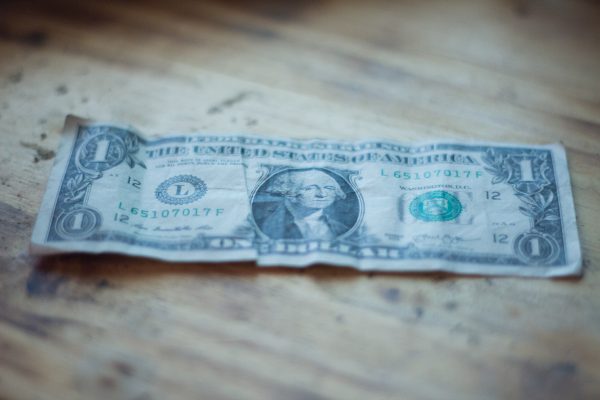How Going Cash-Only Helped Me Save Money

Do you ever find yourself wishing you’d followed your parents’ advice to keep a $20 in your wallet at all times?
When I began living on my own I often found myself without cash when I needed it most, like at the laundromat or at a parking meter (I grew up in a town with free parking town-wide so I wasn’t used to needing coins). I decided after a few of these cash-less situations that it was time to make sure that I always had a little cash at hand. It started out as “emergency” money, and slowly transformed into a way to save money.
My decision to go cash-only also stemmed from the fact that at the time I was in a city where I didn’t have access to my credit union account. I was doing a six-month paid internship in Omaha, Nebraska and the program hadn’t switched over to direct deposit; every two weeks I left work with a paper paycheck. I had to set up a bank account at an Omaha bank in order to cash my checks but it took about a month before I got an ATM card to use with the account.
I could have put my expenses on a credit card until my ATM card came through, but instead I decided to solve the cash-flow problem with literal cash — specifically, by going into the bank and withdrawing $200 in spending money. This $200 needed to cover everything I paid for, mainly gas and groceries. I liked this system so much I did it the next time I got my biweekly paycheck. Then I started telling myself that if it came to the end of the two weeks and there was cash left over, I would put it in my apartment and keep it as “fun money.” This money actually funded an all-inclusive trip to Jamaica where a friend of mine was getting married the following year.
Once I got back from Omaha and got my current job I decided to keep using my cash-only method. Since I am currently living with my parents my expenses are significantly smaller, which also means I’ve been saving a ton of money.
I started my current job in March 2018. Every two weeks I take $200 out of my paycheck in cash, and that covers my expenses for those two weeks. I also put $200 a month towards my car loan, which, in 2018, left me with almost $1,000 per month that went straight into my savings account from my paycheck, untouched. Money that would be going towards bills if I lived on my own.
In 2019, my expenses increased by $300 a month for payment on my hearing aids. But I will still be stashing away $700 from my paycheck, every month — and that doesn’t include any of the cash I don’t spend. As of this writing, I have saved $1,269.50 in cash, on top of what I save from my paycheck.
You’ll probably say that the only reason I’ve been able to save this much is because my expenses are so low. That’s part of it, but believe me — I could easily spend $100 per week if I wanted to. Clothes, snacks, books; there are plenty of places my money could go. But I’m trying to challenge myself to save as much of my cash as I can. Every week, I ask myself whether I can save more cash than I saved the previous week.
When I find myself in a situation where I can’t pay in cash, I shy away from my credit cards and only use my debit card. This way at the end of the month I don’t have to worry about making a payment on my cards. I know a lot of people use credit cards for the points and rewards, but for me, the amount I save in cash makes more sense.
Not to mention I like paying with cash. I can monitor how much money I have left for the week because I can actually see the money I am spending. When I first started doing this it was out of convenience. But after seeing the results, I don’t think I could go back to paying with plastic.
Josie Mumm is the owner of The Roaming Freelancer where she provides location-independent writing and photography services for businesses. She is passionate about the outdoors, teaching herself code, and paying in exact change.
Photo by Jack Harner on Unsplash.
Support The Billfold
The Billfold continues to exist thanks to support from our readers. Help us continue to do our work by making a monthly pledge on Patreon or a one-time-only contribution through PayPal.
Comments